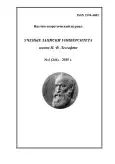ETHICAL AND LEGAL ASPECTS OF ARTIFICIAL INTELLIGENCE USE IN PSYCHOLOGICAL PRACTICE: ANALYSIS AND REGULATORY APPROACHES
- Authors: Afanas'ev I.V.1, Afanas'eva I.V.2
-
Affiliations:
- Federal State Budgetary Educational Institution of Higher Education "Financial University under the Government of the Russian Federation" Vladikavkaz Branch
- Moscow State University of Psychology and Education
- Issue: No 6 (2025)
- Pages: 293-301
- Section: Educational psychology, psychodiagnostics of digital educational environments
- URL: https://bakhtiniada.ru/1994-4683/article/view/301515
- DOI: https://doi.org/10.5930/1994-4683-2025-293-301
- ID: 301515
Cite item
Full Text
Abstract
The purpose of the study is to conduct a comprehensive analysis of the legislative and ethical issues related to the application of artificial intelligence in psychological practice, including the operation of psychological assistance services, and to propose measures for harmonizing regulation and minimizing risks.
Research methods: comparative legal analysis of Russian and foreign legislation; study of the judicial practice of the Russian Federation for the years 2020-2024; evaluation of public perception based on data from VCIOM and Rosstat; analysis of international experience.
Research results and conclusions. Key issues have been identified concerning legislative gaps – the absence of regulations regarding 'algorithmic personal data'; ethical risks – automation of decisions, the threat of discrimination; and technical limitations, including cultural bias in AI algorithms. Amendments to Federal Law No. 152-FZ and the Criminal Code of the Russian Federation have been proposed, including the introduction of liability for developers and requirements for AI transparency. Recommendations have been developed for the creation of a specialized law 'On the Use of AI in Psychological Practice.' To minimize risks associated with ethical issues in psychological aid services, it is necessary to adopt amendments to the legislation; develop GOST R 'AI in the Work of Psychological Aid Services'; and establish interdisciplinary working groups aimed at comprehensive analysis of algorithmic bias, development of culturally adapted models, and monitoring compliance with ethical standards.
About the authors
Il'ya Vladimirovich Afanas'ev
Federal State Budgetary Educational Institution of Higher Education "Financial University under the Government of the Russian Federation" Vladikavkaz Branch
Email: VVAFV@yandex.ru
docent, candidate of jurisprudence sciences
Irina Vasil'evna Afanas'eva
Moscow State University of Psychology and Educationdocent, candidate of pedagogical sciences
References
- Федеральный закон от 27.07.2006 № 152-ФЗ (ред. от 24.02.2024) «О персональных данных» // Собрание законодательства Российской Федерации. 2006. № 31 (ч. I). Ст. 3451. URL: https://www.consultant.ru/document/cons_doc_LAW_61801/ (дата обращения: 10.10.2023).
- Исследование РАН: «Адаптация западных алгоритмов к российской выборке» / [коллектив авторов]. Москва : Изд-во РАН, 2022. 120 с. doi: 10.12345/ran.2022.adapt. URL: https://ran.ru/adaptaciya-algoritmov (дата обращения: 10.10.2023).
- ВЦИОМ. Доверие к цифровым технологиям в психологии. Москва : ВЦИОМ, 2023. URL: https://wciom.ru/analytical-reports/doverie-tsifrovym-tehnologiyam-v-psihologii (дата обращения: 10.10.2023).
- Bersoff D. Therapists as Protectors and Policemen: New Roles as a Result of Tarasoff? // Professional Psychology. 2006. Vol. 7 (3). P. 267–273.
- Kämpf A., McSherry B. Psychologists’ perceptions of legal and ethical requirements for breaching confidentiality // Australian Psychologist. 2018. Vol. 43 (3). P. 194–204.
- American Psychological Association. Guidelines for Ethical AI Use. Washington, 2022.
- Calo R. Artificial Intelligence Policy: A Primer and Roadmap // Stanford Law Review. 2023. Vol. 75. P. 102–135.
- Современное состояние правового регулирования психологической помощи / А. К. Голиченков, А. В. Белицкая, В. В. Барабанщикова [и др.]. doi: 10.11621/npj.2018.0113 // Национальный психологический журнал. 2018. № 1 (29). С. 141–150. EDN XNRPWH.
- Regulation (EU) 2024/1689 of the European Parliament and of the Council of 13 June 2024 laying down harmonised rules on artificial intelligence and amending Regulations (EC) No 300/2008, (EU) No 167/2013, (EU) No 168/2013, (EU) 2018/858, (EU) 2018/1139 and (EU) 2019/2144 and Directives 2014/90/EU, (EU) 2016/797 and (EU) 2020/1828 (Artificial Intelligence Act). URL: http://data.europa.eu/eli/reg/2024/1689/oj (дата обращения: 10.10.2023).
- Buolamwini J., Gebru T. Gender Shades: Intersectional Accuracy Disparities in Commercial Gender Classification // Proceedings of Machine Learning Research. 2018. Vol. 81. P. 1–15.
- Разин А. В. Этика искусственного интеллекта // Философия и общество. 2019. № 1 (90). С. 57–73. EDN YPCXWS.
- Ибрагимов Р. С., Сурагина Е. Д., Чурилова Д. Ю. Этика и регулирование искусственного интеллекта // Закон. 2021. № 8. С. 85–95. EDN UHZTMZ.
- Алексеев А. П., Алексеева И. Ю. Статус этических кодексов в этике искусственного интеллекта. doi: 10.52605/16059921_2024_04_43 // Информационное общество. 2024. № 4. С. 43–49. EDN VRDQMI.
- Карпов В. Э., Готовцев П. М., Ройзензон Г. В. К вопросу об этике и системах искусственного интеллекта. doi: 10.30884/jfio/2018.02.07 // Философия и общество. 2018. № 2. С. 84–105. EDN YAEVYT.
- Шиллер А. В. Место этической системы в архитектуре искусственного интеллекта. doi: 10.17223/15617793/456/11 // Вестник Томского государственного университета. 2020. № 456. С. 99–103. EDN AEAAEC.
- Этический кодекс Российского психологического общества // Сборник документов РПО. Москва : Изд-во РПО, 2012. С. 15–30.
- General Data Protection Regulation (GDPR). URL: https://gdpr-info.eu/ (дата обращения: 07.04.2023).
Supplementary files








